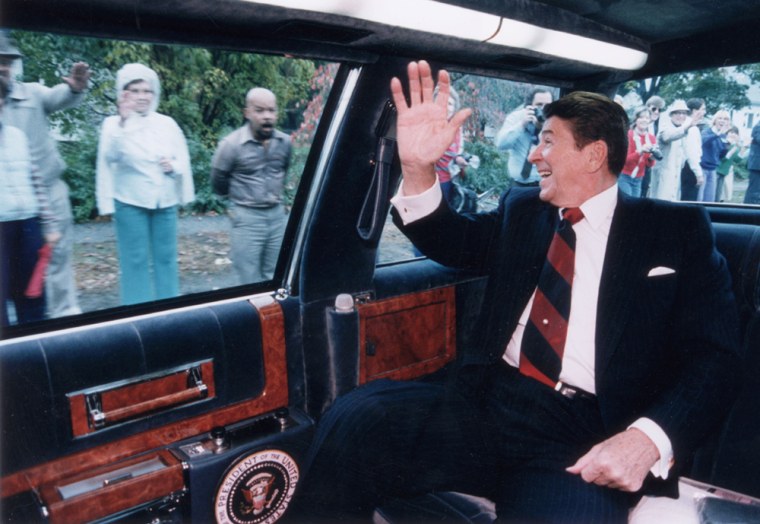When he went on television—as he did for four decades— Ronald Reagan played in a higher league than other politicians.
In 1956, the Democratic presidential candidate hated television. The high-minded Adlai Stevenson, former governor of Illinois and future U.N. ambassador, thought it below him. To him, television smelled of Madison Avenue.
Worse yet, that little box with the fuzzy picture was a mystery to him even when he was coerced into hiring a bright young University of Chicago grad, Bill Wilson, as his consultant on the new medium.
The problem was that Stevenson, skilled at giving speeches in person, had only a faint idea what Wilson's job was. "I'm having a lot of trouble getting a picture on my television set," the upset candidate phoned Wilson one night during the '56 Democratic convention. Would he be kind enough to hustle over to the Blackstone Hotel and fix it?
That same year, Ronald Reagan was racking up some of the best numbers on TV. Where Democrats' guy couldn't tell the difference between his media consultant and a TV repair man, General Electric Theater was the third most popular show on television.
As I said, he was up playing in the majors while the other side was still in peewee.
Nor did he surrender his advantage, grabbed with his debut on G.E. Theater in 1954, not until that beautiful, truly Lincolnesque letter he wrote the country in 1994 telling us of his Alzheimer's.
When it came to using television, let's agree, it was rarely much of a contest. When Reagan ran for California governor in 1966, the opposition ran an ad reminding voters that it was "an actor" who shot Abraham Lincoln. Let's count the people that turned off:
- Everyone who made a nickel in the film and television industry, and that's a lot of Californians.
- Everyone who liked movie stars.
- Everyone who knew Reagan, not as an actor playing somebody else but as the guy who came into our home every week as himself, you know, "Your host, Ronald Reagan." When the politicians were out with the boys, riding what Reagan called "the mashed potatoes circuit," he was home with their families.
As Pat Brown, the once-popular incumbent Reagan bounced from the governor's chair in '66, the challenger had succeeded with the public in making himself one of "us." He reduced the Democratic governor to being one of "them."
Reagan liked being one of us. He used television is keep it happening. On G.E. Theater, he wasn't a star, simply our "host." He was going to watch the show along with us. He didn't make the company products, he simply enjoyed them, as we could at he and his family's "totally electric home."
In politics, that's called positioning. For forty years, Reagan used television to place on our side of events. "There you go again," he chided Jimmy Carter in their 1980 debate as if he next to us on the couch.
It was an instinct for the camera he never lost.
I recall the January night in 1983 when he came to the Capitol to deliver the State of the Union. Armed with copies of the speech, Democrats on the House floor were planning to bushwhack the President. They found a line in the text of Reagan's speech delivered to the press where he appeared to admit it was the administration's duty—his— to do something about the jobless rate then hovering in low double digits. "We who are in government must take the lead in restoring the economy."
The Democrats had hatched a plan, which they proceeded to execute. As the President read the line, they rose in a standing ovation thereby intending to embarrass him.
For a moment Reagan seemed to be caught off guard. The message to the country was sharp and sound: They were cheering the President's grudging admission that it was up to his Administration to do something. Reagan paused, waiting for the applause to abate, acknowledging the little tease from the Democratic backbenchers with a long, good-natured smile.
Then, with perfect Jack Benny timing, came the haymaker: "And there all along I thought you were reading the papers." The Democrats, thinking the President was referring harmlessly to the speech texts many of them had in their laps, erupted in laughter. They had failed to see the mischief. To the people back home in their living rooms, the barb was unmistakable: those legislators were just a pack of feet-up-on-the-desk, newspaper-reading, cigar-chomping pols. Reagan, the master, had got his 'studio audience' to provide a laugh track for the joke of which they themselves were the butt.
A week later, he pulled a similar number, this time employing the White House press corps as his studio audience. In the midst of an afternoon press conference, his wife, Nancy, wheeled in a birthday cake. The President was seventy-two.
As Reagan cheerily began slicing pieces for all those assembled, ABC's Sam Donaldson barked out, "But you understand we won't sell out for a piece of cake. No deals."
"Oh," the President said, looking directly at Sam, "you've sold out for less than that."
Ronald Reagan dominated television not just because of his ability with a script but ceaseless attention to the camera. More than anyone else in the room, he knew what we would see. That made him one of "us." And that, right to the end, meant all the difference.
